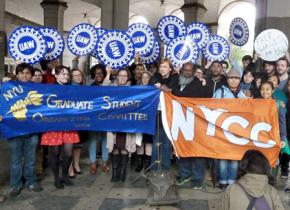Graduate student employees take on NYU
reports on the preparations of the Graduate Student Organizing Committee for a possible strike against New York University for a living wage and benefits.
GRADUATE STUDENT workers at New York University (NYU) are taking a strike authorization vote this week.
The union for graduate employees at NYU--the Graduate Student Organizing Committee (GSOC), which is part of the United Auto Workers--is locked in a contract dispute with the university. NYU has been unwilling to budge on even the most modest demands, refusing even to submit a counterproposal to GSOC's demands.
In order to pressure the university, Academic Workers for a Democratic Union (AWDU), the reform caucus that swept a bargaining committee vacancy election in September, has led a sustained campaign to increase rank-and-file militancy in order to win a fair contract.
"We must maximize graduate student worker empowerment and participation to win a strong contract," reads the AWDU mission statement.
According to an organizing summary put out by the caucus, AWDU has held open bargaining sessions, launched a coalition campaign, organized a letter-writing campaign, organized rallies and pickets at the university library, built ties with NYU Polytechnic School of Engineering and garnered positive media attention from numerous outlets.

Now the strike authorization vote is a chance for the caucus to mobilize the rank and file for this fight, which is necessary because NYU President John Sexton is an experienced strikebreaker.
Sexton's administration refused to negotiate with GSOC during a 2005-2006 spring semester strike for recognition and threatened to refuse stipends and lock out workers who planned to strike through the fall semester.
In May, police violently broke a strike at a construction site at NYU's Abu Dhabi campus, where NYU has consistently violated its own "statement of labor values." The roughly 6,000 workers at NYU Abu Dhabi are highly exploited, mostly migrant workers housed in large labor camps that are closed to the public by armed guards.
While workers in Abu Dhabi build NYU's global expansion, graduate student workers at the Polytechnic School of Engineering (Poly) build the success of the university's high-profile expansion into Brooklyn for only $10 an hour. Many of these workers are international students whose visas do not permit them to work other jobs.
Across Poly and NYU's main campus, graduate student workers are not paid livable wages for New York City, while also being forced to pay out of pocket for high insurance premiums.
Furthermore, NYU offers graduate student workers almost nothing in the way of dental care, forcing workers to pay for cleanings and checkups from dental students and often forego more extensive work. Proper dental care should not be a privilege but with their low wages and poor benefits, that's just what it is for graduate student workers at NYU.
WITHOUT FAIR compensation, graduate student workers cannot perform their job to the top of their capabilities. And because graduate student workers and adjunct professors--whose compensation is similarly unjust--take on roughly 60 percent of the teaching load at NYU, fair compensation for graduate student workers is essential to NYU's ability to provide excellent education.
In truth, the high-profile members of the administration who award themselves massive bonuses do not really effect the everyday education of the average NYU undergraduate--short of devising new ways to land them further in debt. The graduate student workers, on the other hand, are in the classroom teaching everyday.
"We're just asking NYU to prioritize the education of its students," bargaining committee and AWDU member Natasha Raheja said.
NYU can afford a fair contract. According to the university's 990 tax form for 2013, which is available for request on the university's website, NYU reported excess revenues of $399 million.
While GSOC is independently costing out its proposals, Raheja said the university has continually delayed its requests for necessary information. By withholding information, the administration is continuing its pattern of refusing to bargain in good faith and attempting to siderail GSOC's abilities to strengthen its case.
The logic of NYU is that of capitalism: expand, as cheaply as possible.
NYU is leading the neoliberal charge in higher education, and, as the only graduate student union at a private university, GSOC is organizing in the belly of the beast. They represent the only union challenge to NYU in New York and, with the social justice orientation of AWDU, have the potential to become a bulwark for democracy on campus.
The first step, however, is winning a fair contract. If it comes down to a strike, GSOC members will have to mobilize in full force. NYU students, workers and faculty who value democracy and workers rights should stand with them in solidarity.
As it showed in 2005 and again in Abu Dhabi, the Sexton administration will not budge without a fight--and GSOC and its allies are organizing to give it one. AWDU's coalition campaign has already built close ties with NYU Divest, Students Labor Action Movement and Faculty Against the Sexton Plan, but GSOC needs many more members of the NYU community to come out in force.
"We are stronger together and we are united in this," Raheja said. "It is in our interest to maintain the integrity of the university and fight its corporatization."


